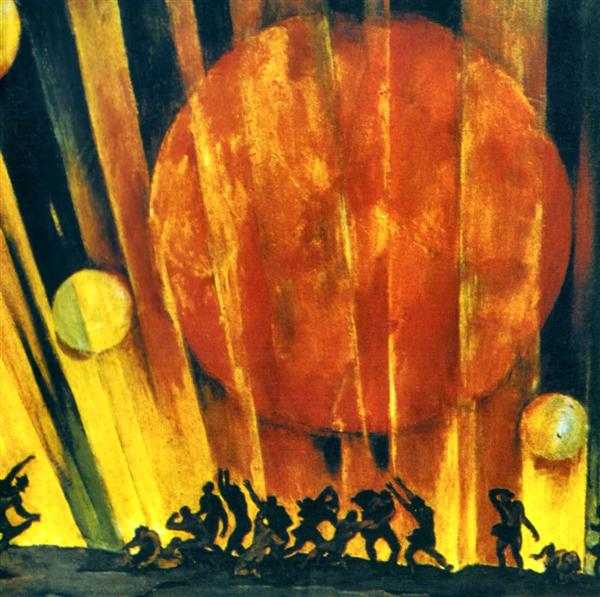Spite Extreme Wing was an Italian black metal band with a vision rooted in their national culture or what they perceived as a manifestation of its innate transcendental aspect. On their older albums they are perhaps comparable to Sigrblot or Kaevum, either aesthetically, or by following similar approach to constructing identity of their art. On their later albums however, the elements responsible for the more familiar sound of the above mentioned Scandinavian bands were dropped in favor of a new approach more coherent with their own national spirit.
The final album from this band, Vltra, despite a backdrop of keyboards is comprised of music of concrete grandiosity adherent to simple, universal forms of antiquity. Thin, overdriven guitars, clean parts and neo-classical ritualistic elements suggest that the black metal framework was merged with neo-folk leanings. The neofolk twist may not work out as well as the band hoped. Black metal, in a roughly similar area, achieved a stronger and more natural voice than neo-folk did because it was tied forever to a fin de siècle mentality, found in apocalyptic rock songs and other trappings of modernity. Neo-folk possesses controversial elements that drive it only as far as counterculture possibly can, but that is to an extreme fringe which still remains within limits of currently obligatory paradigm.
As a result, Vltra is more interesting than their earlier material, but in a way that a modern work of art is supposed to be: varied, edgy, well-crafted, intelligent. Beyond those surface traits, a more natural aspect of the album points to an issue with the range of ideas which black metal is able to transmit only if centered in a particular scene or local culture. By simply following their traditional Roman ideal to some of its consequences, Spite Extreme Wing lost the unique and mysterious depth of northern bands.
Their more traditional attack on Magnificat, Non Dvcor, Dvco and even Kosmokrator was not only quite decent but also in a way seemed more proper. It appears as if there is a some sort of cultural difference between their albums. On Vltra we hear the product of developed, genuine idealism, but one that bears the mark of different European landscape than that responsible for more primal, naturalistic and dim structures of northern bands. Perhaps both are legitimate, but there is something in black metal we naturally anticipate which others can only imitate through utilization of techniques associated with it.
There is black metal as a general set of abstract ideas and there is black metal as a manifestation of a distinctive spirit carrying mark of a particular landscape, and this latter form not coincidentally remains a variant most meaningful and true to its natural language. When updated ideas of black metal became desired, they were usually adopted as an extension this language of their innovators. That approach was compatible with the model in which the music industry operated at the time. Now conditions are different. Not only metal, but specifically black metal must go deeper underground. Not deeper in “horizontal” aspect, but inward, into greater differentiation, which nevertheless should be consistent with the high points of the genre in the past.
Given that last criteria, parts of the back catalog of Spite Extreme Wings and Vltra as a whole are simply regressive. But their other qualities were perhaps dawn of a new understanding. One possible future of black metal lies in appreciation of common tradition through the lenses of particular nations, and with a shift of orthodoxy from being faithful to styles in which tradition was originally delivered, to being possibly most faithful to spirit of regional cultures.
Their music may be still widely available, as we are accustomed it is, but it will not be crafted by universalist thought for any global audience. It will simply serve as reinforcement and development of culture of their own people and values and reasons of such particularity that they are mostly incommunicable to others. This obscurity makes Spite Extreme Wing both challenging to the past of black metal, and faithful to the future of that and all related genres.
Tags: Black Metal, neo-folk, review, spite extreme wing



This sounds like Def Heaven covering Inquisition.
Seems like a definition of post black metal: All the ingredients are there in carefully measured quantities, skillfully mixed with more popular idioms contributing to the same kind of strangely beautiful atmosphere, and all toned down so that it can be installed in a living room without disturbing the general pastel-colouredness in the slightest.
The result fails on all levels: It’s too lame to be rock, to nice and harmless to be black (or any metal) and too overproduced to be »authentic« folk. Unless someone from the band has a grandfather who once stood next to a guy who had seen Mussolini the day before, Kim Kelly should love this.
I agree with most of your criticism, but you are still missing my point here.
I didn’t mean to comment on the text, just on the music.
Regionally focussed black metal bands exist, BTW. An example I came accross recently would be
https://www.youtube.com/watch?v=NrFEHBZI0L4
In my opinion, such a narrowing will make it difficult to avoid degenerating into mere folklore, IOW, somehow coloured entertainment. Artisanship instead of art. OTOH, counter-examples exist (Gotthelf’s Die schwarze Spinne would be one).
Sounds more like fucking Amon Amarth